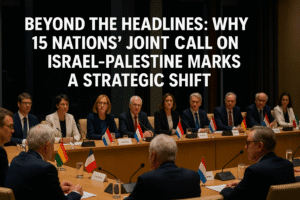Beyond the Headlines: Why 15 Nations’ Joint Call on Israel-Palestine Marks a Strategic Shift
Fifteen nations, including key Western allies, issued a unified demand for an immediate Gaza ceasefire and the unconditional release of all Hamas hostages. They forcefully condemned the October 7th attacks while reaffirming an unwavering commitment to a two-state solution, explicitly requiring Gaza’s unification with the West Bank under the Palestinian Authority (PA). Crucially, these states announced they have already recognized Palestine, or are actively willing to do so, framing this as essential for peace and urging all nations to follow suit.
Simultaneously, they called on holdout countries to normalize relations with Israel and discuss its regional integration. The statement leverages welcomed PA reform commitments—condemning terror, disarming Hamas, ending prisoner payments, and accepting demilitarization—as benchmarks. This coordinated diplomatic push, timed ahead of critical UN meetings, aims to pressure both sides towards a future excluding Hamas from governance and sets concrete preconditions for progress.

Beyond the Headlines: Why 15 Nations’ Joint Call on Israel-Palestine Marks a Strategic Shift
The Ministers of Foreign Affairs of 15 nations – Andorra, Australia, Canada, Finland, France, Iceland, Ireland, Luxembourg, Malta, New Zealand, Norway, Portugal, San Marino, Slovenia, and Spain – issued a powerful joint statement in New York on July 29th, 2025. This isn’t just another diplomatic communiqué; it represents a coordinated, high-stakes push reshaping the international approach to the Israeli-Palestinian conflict ahead of critical UN meetings. Here’s the substance and the significance:
Core Demands: A Clear, Unified Stance
- Unequivocal Condemnation & Immediate Action: The statement forcefully condemns the October 7th, 2023 attacks as “heinous and antisemitic terrorism.” Crucially, it couples this with concrete demands: an immediate ceasefire, the unconditional release of all Hamas hostages (including remains), and unhindered humanitarian access to Gaza. This linkage is deliberate, addressing Israeli security concerns while prioritizing the dire humanitarian crisis.
- Reaffirming the Two-State Imperative: The ministers leave no ambiguity: their “unwavering commitment” is to a two-state solution. They explicitly define this as two democratic states, Israel and Palestine, coexisting peacefully within secure, recognized borders based on international law and UN resolutions. A key operational detail: unifying Gaza and the West Bank under the Palestinian Authority (PA). This directly challenges any notion of Israel maintaining long-term control over Gaza or its separation from the West Bank.
- Acknowledging Palestinian Reform Commitments: The statement notably welcomes specific commitments made by Palestinian Authority President Mahmoud Abbas on June 10th, 2025. Highlighting these points signals that international recognition hinges on tangible Palestinian actions:
- Condemning the October 7th attacks.
- Calling for hostage release and Hamas disarmament.
- Terminating the controversial prisoner payment system (often criticized for incentivizing violence).
- Implementing schooling reforms (presumably removing incitement).
- Calling elections within a year for “generational renewal.”
- Accepting the principle of a demilitarized Palestinian state.
The Diplomatic Bombshell: Recognition & Regional Integration
- The Recognition Pledge: This is the statement’s most forward-leaning element. The 15 nations declare they “Have already recognized, have expressed or express the willingness or the positive consideration of our countries to recognize the State of Palestine.” They frame this as “an essential step towards the two-state solution” and explicitly invite all other countries to join them. This is a coordinated move designed to build critical mass for Palestinian statehood before the UN General Assembly’s high-level week in September 2025, significantly raising the diplomatic stakes.
- The Call to Israel’s Holdouts: Simultaneously, the group urges countries that haven’t yet done so to “establish normal relations with Israel” and express willingness to discuss “the regional integration of the State of Israel.” This dual track is significant: it offers Israel a path towards normalized ties and regional acceptance, implicitly contingent on progress towards the two-state solution outlined.
- Planning for the “Day After”: The ministers express determination to work on an architecture for Gaza’s future that guarantees reconstruction, Hamas disarmament, and crucially, Hamas’s exclusion from Palestinian governance. This underscores the international consensus that Hamas cannot be part of a future Palestinian governing structure, aligning with the PA’s stated commitment to disarm the group.
Why This Matters: The Human and Strategic Insight
- Timing is Strategic: Issued just weeks before the 80th UNGA session, this is a clear attempt to set the agenda and pressure other nations to take sides on recognition and the two-state framework.
- Beyond Symbolism: While recognition itself is symbolic, the coordinated nature of this move by a diverse group (including key US allies like Australia, Canada, and NZ) makes it harder to ignore. It signals a potential fracturing of the traditional Western bloc’s stance.
- Leverage Through Linkage: By tying potential Palestinian statehood recognition to specific PA reforms (condemning terror, ending prisoner payments, demilitarization) and demanding hostage release/ceasefire, the group attempts to create leverage over both sides.
- Addressing Core Obstacles: The statement tackles head-on some of the most intractable issues: Hamas’s role (or lack thereof), the need for Palestinian governance reform, the future status of Gaza, and the prisoner payment system – issues often sidelined in broader calls for peace.
- A Path Offered, Not Just Imposed: The call for others to normalize relations with Israel and discuss regional integration offers a tangible incentive for Israel, framing peace as a gateway to broader acceptance.
The Road to September
This joint statement is more than a condemnation or a plea; it’s a strategic blueprint laid down by a significant coalition. It sets clear preconditions (PA reforms, hostage release), outlines a desired end-state (democratic states, unified Palestinian governance, demilitarized Palestine), and deploys powerful diplomatic tools (coordinated recognition, normalization incentives).
The pressure is now on other nations to respond, on the PA to deliver reforms, on Hamas to release hostages, and on Israel to engage with a process that demands difficult concessions. The success or failure of this initiative will be measured starkly when world leaders gather in New York this September. The “New York Call” has set the stage; the world awaits the next act.
You must be logged in to post a comment.